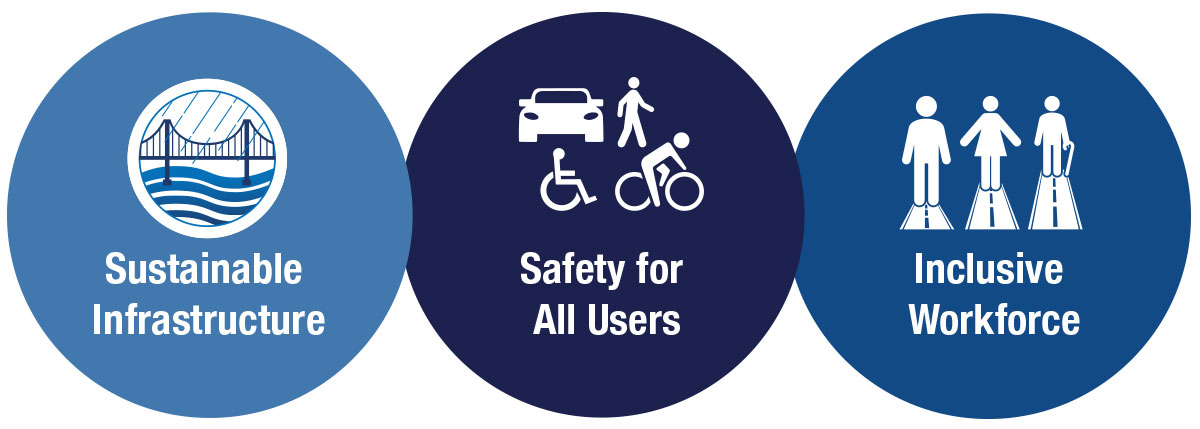Event Details
Register Now for EDC-7 Virtual Summit
The EDC-7 Virtual Summit registration link is now live! The summit, taking place from February 14-16, 2023, brings together transportation leaders and frontline professionals responsible for developing and delivering highway projects. We welcome participation from all of our partners - State transportation departments, local agencies, Federal land management agencies, tribes, and industry.

In this cycle of EDC, the seven initiatives feature strategies to improve safety for all users, build sustainable infrastructure for the future, and grow an inclusive workforce. Learn more about each of these in the EDC-7 overview video. Each day of the summit will open with a session featuring speakers including FHWA leadership and innovation champions from the public and private sectors. There will be presentations, fact sheets, videos, virtual booths, and pdfs of innovations developed by the National State Transportation Innovation Council (STIC) Network available to all registered participants.
Not sure which breakout session to attend? Watch these short videos on each of the EDC-7 innovations to learn more about what to expect.
We look forward to seeing you there!
For More Information:
About EDC
Every Day Counts, a state-based initiative of the Federal Highway Administration's Center for Accelerating Innovation, works with state, local and private sector partners to encourage the adoption of proven technologies and innovations to shorten and enhance project delivery.
EDC News is published weekly by the FHWA Center for Accelerating Innovation.
Notice:The U.S. Government does not endorse products or manufacturers. Trademarks or manufacturers' names appear in this presentation only because they are considered essential to the objective of the presentation. They are included for informational purposes only and are not intended to reflect a preference, approval, or endorsement of any one product or entity.
Recommended Citation:
U.S. Department of Transportation, Federal Highway Administration
EDC News; January 12, 2023
Washington, DC
https://doi.org/10.21949/1521900
Nighttime Visibility for Safety
The nighttime crash fatality rate is three times the daytime rate. Enhancing visibility along corridors, intersections, and pedestrian crossings can help reduce fatalities. This initiative promotes traffic control devices and properly designed lighting to improve safety for all users.
Next Generation TIM: Technology for Saving Lives
Over six million crashes a year in the U.S. put responders and other vulnerable road users at risk. Next-Generation Traffic Incident Management programs promote emerging technologies such as emergency vehicle lighting and queue warning solutions. These and other tools can advance safety and operations to mitigate incident impacts.
Integrating GHG Assessment and Reduction Targets in Transportation Planning
Transportation is the largest emitter of greenhouse gases in the U.S. This initiative provides resources to help agencies quantify greenhouse gases and set goals to decrease motor vehicle, construction, and life-cycle emissions through planning and project development.
Enhancing Performance with Internally Cured Concrete (EPIC2)
Cracking in concrete is a limiting factor in achieving long-term concrete performance. Internal curing mitigates shrinkage cracking and has the potential to substantially extend the service life of concrete bridge decks and enhance the performance of pavements and repairs.
EPDs for Sustainable Project Delivery
Construction materials such as concrete and asphalt have environmental impacts during their life cycle. Environmental product declarations, or EPDs, document those impacts. This tool helps States support procurement decisions and quantify embodied carbon reductions using life cycle assessments for sustainable pavements.
Rethinking DBE for Design-Build
Many disadvantaged business enterprise program procedures do not adequately address design-build contracting. New practices are available to support the effective integration of program requirements to help small, disadvantaged businesses compete for design-build contracts.
Strategic Workforce Development
The demand for highway workers is growing, and emerging technologies require new skills. This innovation helps stakeholders improve their ability to identify, train, and place highway construction workers. The focus will expand to rural and Tribal communities to increase career opportunities.
